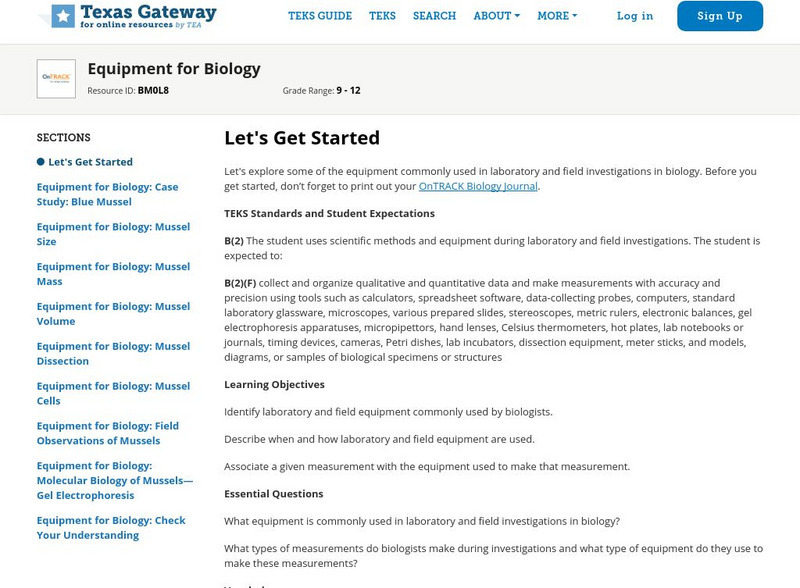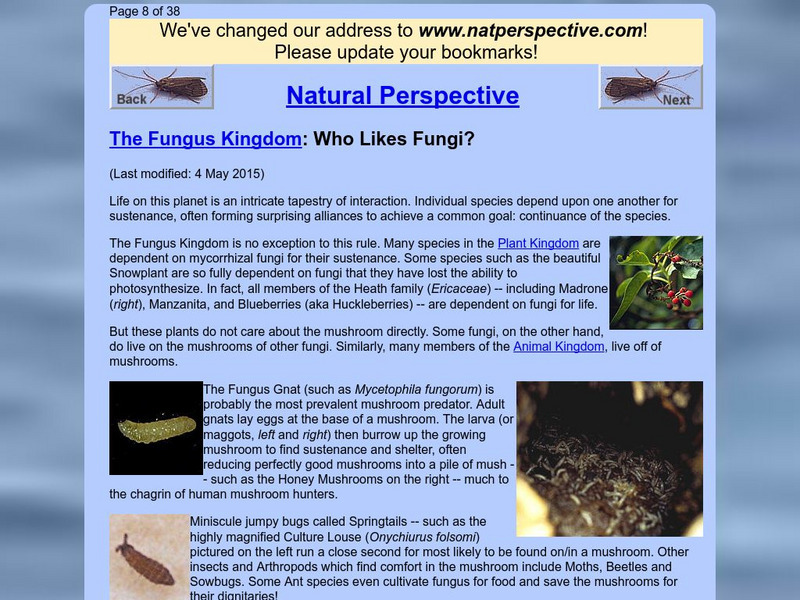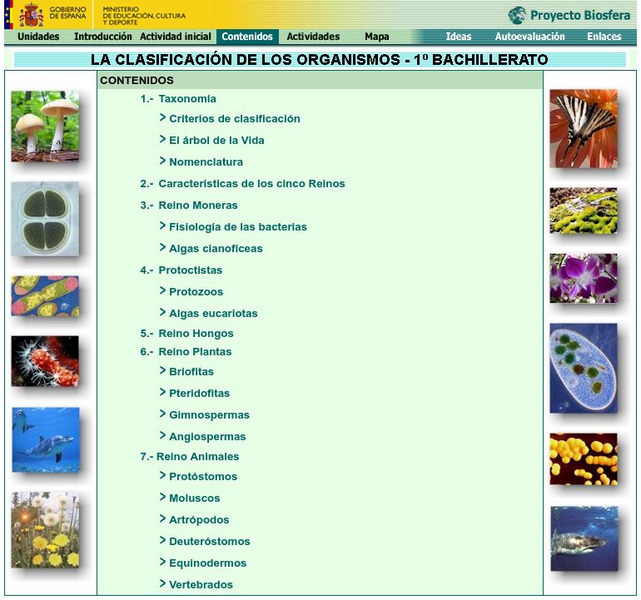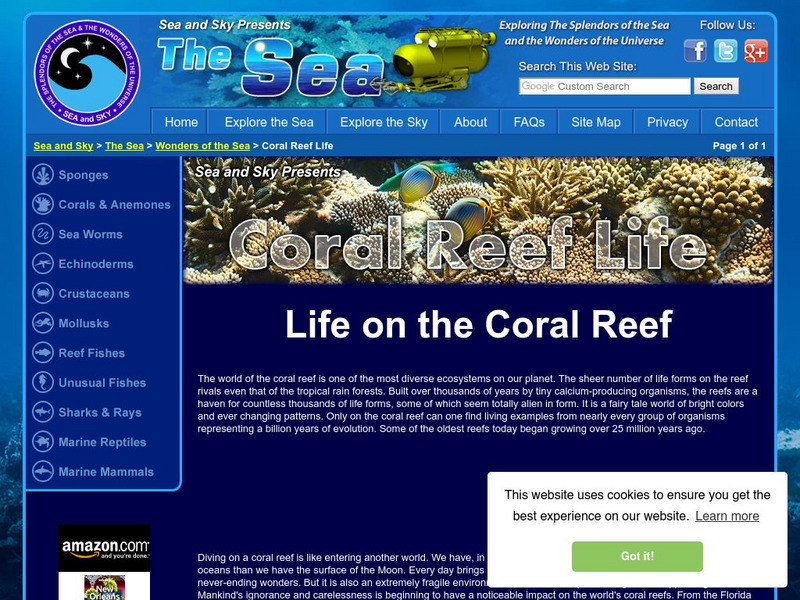Texas Education Agency
Texas Gateway: Equipment for Biology
Given investigation scenarios, students will determine the equipment that best fits the procedure.
Other
Aquascope: The Common Whelk: Survival
This is one page from a site on Welks. It tells about how many of the eggs will survive, the growth rate, how old a whelk can live to be, and it talks about poorly distrubited genes.
Other
Eat the Invaders: Periwinkle
Periwinkles are a non-native, or invasive, species of mollusk along the eastern coast of Canada and the United States. Learn about their habitat, the history of their invasion, and the kinds of damage they do to their new environment....
Texas A&M University
Peer Curricula: Story Time: Thomas H. Huxley
A biography of the remarkable life of Thomas Huxley, who began his life in abject poverty, but through self-education and dedication, became a star in world science.
Virginia Tech
Virginia Polytechnic Institute: Greenhouse Dinosaur Extinction Theory
This comprehensive page discusses the Asteroid Impact vs. Volcano-Greenhouse dinosaur extinction debate. It was written by paleontologist, professor, and scientist Dr. Dewey McLean.
Other
Seafood New Zealand: Greenshell Mussel
This resource contains basic information on the greenshell mussel.
Other
Life on Australian Seashores: Chitons
Gives some distinguishing characteristics of chitons along with some other general information.
Smithsonian Institution
National Museum of Natural History: The Allure of Pearls
Exhibition of some of the first known gems to early humans, this collection of pearls includes several world famous precious stones.
Tennessee History For Kids
Tennessee History for Kids: Tennessee River Freshwater Pearl Farm
When people talk about Tennessee products, they usually talk about crops like soybeans, minerals such as limestone, and man-made things such as cars. During this tour, we'll talk about something produced in the Volunteer State that many...
Other
Natural Perspective: Who Likes Fungi?
This informative sites delves into the fact that in addition to humans we find a variety of animals, insects and mollusks that enjoy mushrooms for different reasons.
Science Education Resource Center at Carleton College
Serc: Mollusc Form and Function
Links to a virtual laboratory that provides information and images regarding mollusc form and function.
National Institute of Educational Technologies and Teacher Training (Spain)
Ministerio De Educacion: La Clasificacion De Los Organismo
This unit will describe the five kingdoms and their main characteristics. It includes 20 interactive activities.
Other
Underwater Photo Tips: Cuttlefish
This site gives great information on the camouflage and communication methods that cuttlefish use, along with their mating habits.
Quia
Quia: Animal Facts Scavenger Hunt
At this website you are given ten questions to answer and links to three websites where you can find those answers.
A-Z Animals
A Z Animals: Animal Facts: Cuttlefish (Sepiida)
Illustrated entry describes Cuttlefish with details about their habitat, diet, breeding, and physical characteristics.
Other
Sea Sky: Reef Life
The coral reef, its composition and inhabitants are explored here in detail. With additional information about the life that inhabits a coral reef.
American Museum of Natural History
American Museum of Natural History: Giant Squid O Logy Card
Flip over this interactive OLogy card and start learning bite-size pieces of useful information about the giant squid, including details regarding its 2006 discovery.
Enchanted Learning
Enchanted Learning: The Squid
Discover more about the squid when you explore this resource. This site includes a diagram of this soft-bodied cephalopod and information on its diet, anatomy, predators and more.
BiologyWise
Biology Wise: Information About the Hydrostatic Skeleton
Explains what a hydrostatic skeleton is and the types of organisms that have one. Describes examples from six phyla and the advantages and disadvantages of this type of skeleton.
Georgia Aquarium
Georgia Aquarium: Giant Pacific Octopus
Use this animal guide to learn the scientific name and discover the habitat, diet, reproduction, physical, and other unique characteristics of the Giant Pacific Octopus.
MarineBio Conservation Society
Marine Bio: Giant Octopuses
Illustrated reference tool features useful information on the giant octopus with details on physical characteristics, behavior, range, habitat, diet, and conservation status.
MarineBio Conservation Society
Marine Bio: Blue Ringed Octopuses
Illustrated reference tool features useful facts on the blue-ringed octopus with details on physical characteristics, behavior, range, habitat, diet, and conservation status.
Monterey Bay Aquarium
Monterey Bay Aquarium: Broadclub Cuttlefish
Meet the broadclub cuttlefish and learn cool facts, its natural history, and conservation status.
Science Education Resource Center at Carleton College
Serc: Clam Review
A virtual clam dissection with high-resolution images of an intact clam, inner surface of valve, overview of clam with left valve removed, and overview of clam with left mantle removed, and more. (Click on the Microbial Life link.)
Other popular searches
- Arthropod and Mollusks
- Mollusks and Dichotomous Key
- Bivalve Mollusks
- Mollusks Prey
- Mollusks Web
- Water and Land Mollusks
- Water Mollusks Land Mollusks
- Bivalave Mollusks
- Water Mollusks
- Mollusks Used as Food
- Univalve Mollusks
- Mollusks Prey and Predators
















